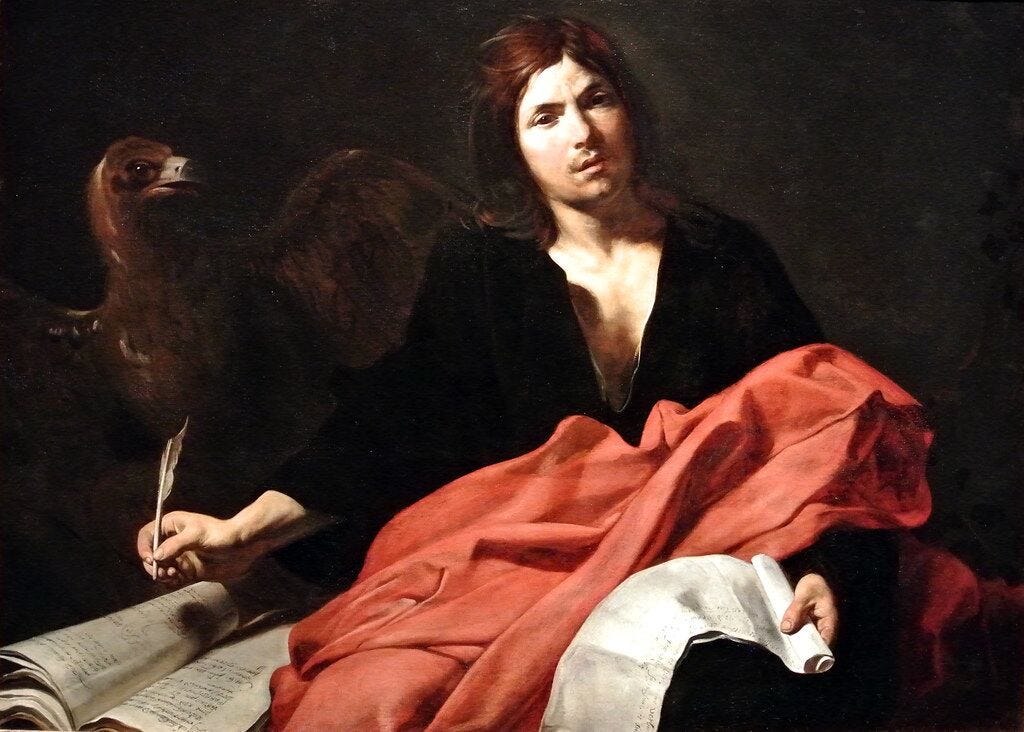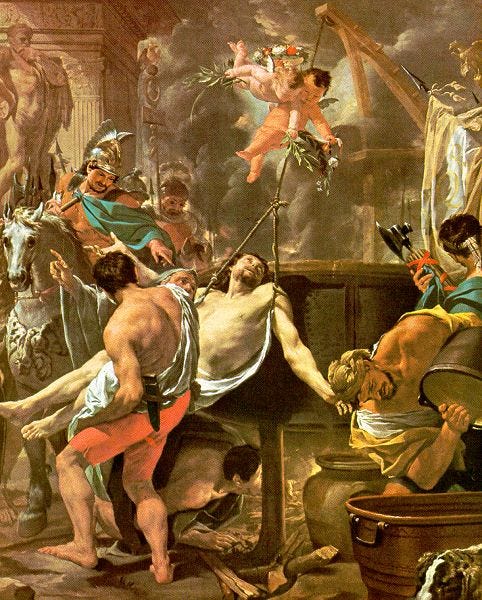Nearest to Jesus' Crib, after Stephen, stands John, the Apostle and Evangelist. It was only right, that the first place should be assigned to him, who so loved his God, that he shed his blood in his service; for, as this God himself declares, greater love than this hath no man, that he lay down his life for his friends [1 John, 15:13] and Martyrdom has ever been counted, by the Church, as the greatest act of love, and as having, consequently, the power of remitting sins, like a second Baptism. But, next to the sacrifice of Blood, the noblest, the bravest, and which most wins the heart of Him who is the Spouse of souls, is the sacrifice of Virginity. Now, just as St. Stephen is looked upon as the type of Martyrs, St. John is honoured as the Prince of Virgins. Martyrdom won for Stephen the Crown and palm; Virginity merited for John most singular prerogatives, which, while they show how dear to God is holy Chastity, put this Disciple among those, who, by their dignity and influence, are above the rest of men…
Such is the companion of Stephen at the Crib, wherein lies our Infant Jesus. If the Protomartyr dazzles us with the robes he wears of the bright scarlet of his own blood -- is not the virginal whiteness of John's vestment fairer than the untrod snow? The spotless beauty of the Lilies of Mary's adopted Son, and the bright vermilion of Stephen's Roses -- what is there more lovely than their union? Glory, then, be to our New-Born King, whose court is tapestried with such heaven-made colours as these! Yes, Bethlehem's Stable is a very heaven on earth, and we have seen its transformation. First, we saw Mary and Joseph alone there -- they were adoring Jesus in his Crib; then, immediately, there descended a heavenly host of Angels singing the wonderful Hymn; the Shepherds soon followed, the humble simple-hearted Shepherds; after these, entered Stephen the Crowned, and John the Beloved Disciple; and, even before there enters the pageant of the devout Magi, we shall have others coming in, and there will be, each day, grander glory in the Cave, and gladder joy in our hearts. Oh! this Birth of our Jesus! Humble as it seems, yet, how divine! What King or Emperor ever received, in his gilded cradle, honours like these shown to the Babe of Bethlehem? Let us unite our homage with that given him by these the favoured inmates of his court. Yesterday, the sight of the Palm in Stephen's hand animated us, and we offered to our Jesus the promise of a stronger Faith: to-day, the Wreath, that decks the brow of the Beloved Disciple, breathes upon the Church the heavenly fragrance of Virginity -- an intenser love of Purity must be our resolution, and our tribute to the Lamb.
— Dom Prosper Gueranger
ON ST. JOHN THE APOSTLE AND EVANGELIST
Consider first, upon how many accounts we ought to honour St. John, the beloved disciple of the Son of God; and to glorify God in him, for the extraordinary gifts and graces bestowed upon him. He was called in his youth, whilst he was as yet innocent and pure, to follow our Lord Jesus; and he readily obeyed the call, and left both his parents and all things else for the sake of Christ. His zeal and fortitude in the cause of his master procured him the name of Boanerges, or a son of thunder. The purity of his soul and body made him a special favourite of his Lord; who therefore admitted him to lean upon his bosom at his last supper, and to draw from that sacred fountain of life the heavenly waters of grace and truth; and on the following day, when he was dying upon the cross, he recommended his virgin mother to his care, that she might be his mother, and he might be her son. O blessed saint, great favourite both of Jesus and Mary, introduce us also, by the interest thou hast now in heaven, into some share in their favour, by procuring for us, by thy prayers, the grace to imitate thy purity.
Consider secondly, to what a height St. John was raised by divine grace. He was made an apostle, and one of the chiefest of the apostles; even one of the three that were chosen by our Lord to be witness both of his glory on Mount Thabor, and of is anguish and agony on Mount Oliver. he was also an Evangelist or writer of the gospel, (which none of the other apostles were, except St. Matthew,) and amongst the four Evangelists is compared to the eagle, (which flies high, and looks upon the sun with a steadfast eye,) because of his sublime beginning, by taking his first flight up to the eternal Word, by whom all things were made; and his following throughout his whole gospel the same sublime course, with his eye still fixed on this great sun of justice, and the immense light of his divinity. St. John was also a martyr, by drinking of the chalice of his Lord, (as he had foretold him,) by a long course of sufferings; and by being at length sentenced to death by the tyrant Domitian, and cast into a vessel of boiling oil, from whence he was delivered by an evident miracle. In fine, he was a prophet, to whom our Lord revealed an infinity of heavenly secrets and mysteries relating to latter times, which we find recorded in his Apocalypse, written during his banishment in the isle of Patmos. See then, my soul how many titles this great saint has to our veneration. But remember, at the same time, that the veneration which will please him best, will be a love and imitation of his virtues.
Consider thirdly, that the writings of St. John recommend nothing so much as charity and verity, love and truth, These they continually inculcate: charity, because God is charity; he is all love, he has died for love; 'Let us therefore love God,' saith he, 'because God first hath loved us.' 'But then this,' saith he, 'is the love of God, this is the Charity we owe him, to keep his commandments. and this commandment we have from God, (the favourite commandment indeed of the Son of God,) that we should love one another.' This love for one another all his epistles are full of; they all breathe this sweet odour; with this they join verity or truth; loving in truth, walking in truth, for the sake of truth, which abideth in us, and shall be with us for ever. And what is this truth, and the life? Such was always the doctrine of St. John: this he perpetually preached, both by word and writing: such was the spirit of this disciple of love.
Conclude to embrace, with all thy soul, this charity and verity, this love and truth so much recommended by St. John, or rather by the spirit of God, through him. Keep close to this charity and verity here, and it will abide with thee for ever hereafter, and will make thee happy for endless ages.— Bishop Challoner
O glorious Apostle, who, on account of thy virginal purity, wast so beloved by Jesus as to deserve to lay thy head upon his divine breast, and to be left, in his place, as son to his most holy Mother; I beg thee to inflame me with a most ardent love towards Jesus and Mary. Obtain for me from our Lord that I, too, with a heart purified from earthly affections, may be made worthy to be ever united to Jesus as a faithful disciple, and to Mary as a devoted son, both here on earth and eternally in heaven. Amen.
As to customs, the most famous is that in his happy memory, Catholics bring wine to church, which the priest blesses, turning it into a sacramental called the "Love of St. John." Catholics use this sacramental wine for special occasions throughout the year and to give to the sick.
When it is drunk on his Feast Day, we drink it before dinner as a toast to St. John. The Father of the house lifts his glass toward Mother and says, "I drink you the love of St. John." The Mother replies "I thank you for the Love of St. John" and then turns to the oldest child, lifts her glass, and says, "I drink you the love of St. John..." -- and on it goes down the line until each has been toasted.
The wine may be drunk as is before and with dinner, as above, or may be mulled and used as in this recipe:
St. John's Love (serves 8)
1 quart red wine
3 whole cloves
1/16 teaspoon ground cardamom
2 two-inch cinnamon sticks
1/2 teaspoon ground nutmeg
1/2 cup sugar
Pour the wine into a large saucepan. Add the remaining ingredients. Heat well for 5 minutes (this can evaporate the alcohol, sadly). Serve hot, clinking glasses with the toast "Drink the love of St. John!"1
Check out The Guild of St Nicholas of Bari for more Christmastide traditions!
https://www.fisheaters.com/customschristmas4.html





